Experts warn of outbreak of gastroenteritis in Karachi, rest of Sindh
Watery diarrhoea is a serious health issue which can take the life of a healthy person within hours if immediate medical treatment is not provided to the patient, says Prof Amanullah Abbasi
Hundreds of people, including children, are being brought to public and private hospitals in Karachi and other parts of Sindh due to acute gastroenteritis, a water-borne disease that cause diarrhoea, health experts said on Sunday as they called for creating awareness among people regarding the prevention of food- and water-borne diseases to minimise preventable deaths.
They were speaking at the signing ceremony of a memorandum of understanding (MoU) between the Pak GI and Liver Disease Society (PGLDS) and a pharmaceutical firm for the launch of the PGLDS Research Awards that would be given to 10 top researchers for their papers in the field of gastroenterology during the coming annual conference of the society in June. Urging the government and pharmaceutical sector to provide funds for research in the area of gastrointestinal diseases, water-borne ailments and blood-borne infections such as viral hepatitis, gastroenterologists advised the people to take precautionary measures like drinking clean water and avoiding eating uncooked food from roadside vendors.
“There is a serious outbreak of acute gastroenteritis in Karachi and other cities of Sindh and hundreds of patients, including children, are being brought to hospitals for treatment. Watery diarrhoea is a serious health issue which can take the life of a healthy person within hours if immediate medical treatment is not provided to the patient,” Prof Amanullah Abbasi, senior gastroenterologist associated with the PGLDS, said while speaking at the MoU signing ceremony.
He claimed that research conducted by Pakistani experts also helped the world understand Covid-19 as dozens of papers on signs and symptoms of the viral disease and its management were published in international journals. He urged the government and private sector to come forward and provide more funds for research in common health issues, including gastrointestinal disorders and water-borne diseases in Pakistan.
Atif Iqbal, managing director of the pharmaceutical firm High-Q, said that in addition to providing funds for research, they were going to import latest technology and Artificial Intelligence (AI)-based solutions for the detection of gastrointestinal disorders in Pakistan.
“But we also need to conduct research locally to come up with our own solutions to the problems facing our people,” Iqbal said and expressed the hope that the PGLDS Research Awards would encourage and promote the culture of research in the field of gastroenterology and other areas of medical profession in Pakistan.
PGLDS patron Dr Shahid Ahmed informed the event that 10 young researchers would be awarded cash prizes for their research in the field of gastroenterology at the 4th annual conference of the PGLDS to be held in June 2022 in Karachi. He added that young doctors and trainees from regional countries and other parts of the world could also submit their papers for research awards. Gastroenterologist Dr Lubna Kamani deplored the fact that due to inexperience and extremely busy hours, most of the young Pakistani health physicians were unaware of the art of medical writing. She stated that very little research was being conducted by our young researchers in the field of gastroenterology.
Another senior gastroenterologist, Dr Sajjad Jamil, criticised the water and sewerage board authorities for failing to provide clean drinking water to the people. He urged the people to take precautionary measures to prevent themselves from common water-borne diseases like diarrhoea and cholera.
He also urged the teachers to educate children about hygiene, saying that some basic health tips like drinking clean water, washing hands before eating, and avoiding unhealthy and junk food should be taught at schools along with languages, sciences and other subjects.
-
 AI Copyright Battle: ByteDance To Curb Seedance 2.0 Amid Disney Lawsuit Warning
AI Copyright Battle: ByteDance To Curb Seedance 2.0 Amid Disney Lawsuit Warning -
 Savannah Guthrie In Tears As She Makes Desperate Plea To Mom's Kidnappers
Savannah Guthrie In Tears As She Makes Desperate Plea To Mom's Kidnappers -
 Canada’s Defence Industrial Strategy Targets 125,000 Jobs And Export Growth
Canada’s Defence Industrial Strategy Targets 125,000 Jobs And Export Growth -
 Tre Johnson, Former NFL Guard And Teacher, Passes Away At 54
Tre Johnson, Former NFL Guard And Teacher, Passes Away At 54 -
 Jerome Tang Calls Out Team After Embarrassing Home Defeat
Jerome Tang Calls Out Team After Embarrassing Home Defeat -
 Cynthia Erivo Addresses Bizarre Rumour About Her Relationship With Ariana Grande
Cynthia Erivo Addresses Bizarre Rumour About Her Relationship With Ariana Grande -
 Prince Harry, Meghan Markle Spotted Cosying Up At NBA All-Star Game
Prince Harry, Meghan Markle Spotted Cosying Up At NBA All-Star Game -
 Lady Gaga Explains How Fibromyalgia Lets Her 'connect With People Who Have It'
Lady Gaga Explains How Fibromyalgia Lets Her 'connect With People Who Have It' -
 Metro Detroit Weather Forecast: Is The Polar Vortex Coming Back?
Metro Detroit Weather Forecast: Is The Polar Vortex Coming Back? -
 Daniel Radcliffe Reveals Surprising Way Fatherhood Changed Him
Daniel Radcliffe Reveals Surprising Way Fatherhood Changed Him -
 ‘Disgraced’ Andrew At Risk Of Breaking Point As Epstein Scandal Continues
‘Disgraced’ Andrew At Risk Of Breaking Point As Epstein Scandal Continues -
 Alan Cumming Shares Plans With 2026 Bafta Film Awards
Alan Cumming Shares Plans With 2026 Bafta Film Awards -
 OpenClaw Founder Peter Steinberger Hired By OpenAI As AI Agent Race Heats Up
OpenClaw Founder Peter Steinberger Hired By OpenAI As AI Agent Race Heats Up -
 Kate Middleton's Reaction To Harry Stepping Back From Royal Duties Laid Bare
Kate Middleton's Reaction To Harry Stepping Back From Royal Duties Laid Bare -
 Rose Byrne Continues Winning Streak After Golden Globe Awards Victory
Rose Byrne Continues Winning Streak After Golden Globe Awards Victory -
 Ice Hockey Olympics Update: Canada Stays Unbeaten With Dominant Win Over France
Ice Hockey Olympics Update: Canada Stays Unbeaten With Dominant Win Over France




